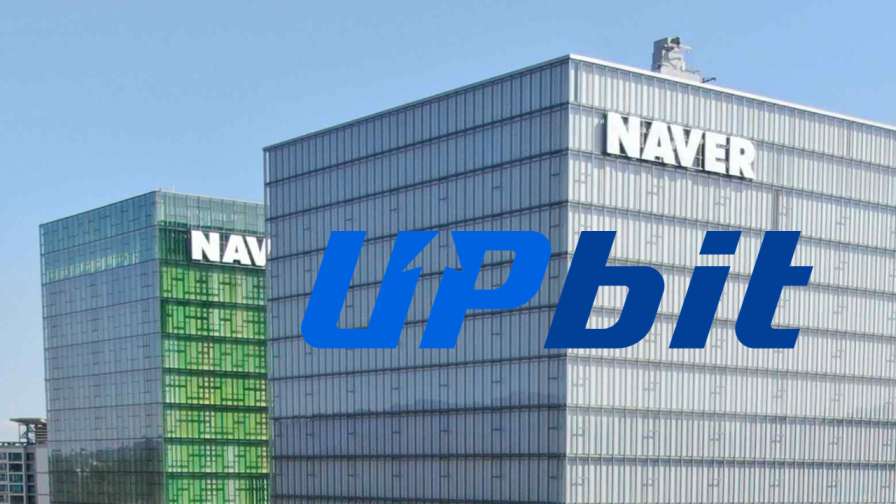Naver acquires South Korea’s largest crypto exchange Upbit in $10.3 billion deal, reshaping country’s fintech and crypto landscape

Naver is about to make the biggest crypto move in South Korea’s history, and it’s doing it with an audacious, all-stock play that could rewrite the country’s fintech future overnight. According to Bloomberg, South Korea’s internet giant has agreed to acquire Dunamu, the parent company of Upbit, in a transaction valued at roughly $10.3 billion, or 15.1 trillion won. The deal signals just how seriously Big Tech now views digital assets.
The agreement, disclosed through a regulatory filing, will pull the nation’s dominant crypto exchange into Naver’s sprawling digital ecosystem, blending payments, trading, and blockchain into a single, tightly integrated platform. At its core, the deal is designed to create a “superapp” that places crypto alongside everyday financial services already used by tens of millions of Koreans.
“Naver Corp. agreed to acquire Dunamu Inc., operator of South Korea’s biggest crypto exchange Upbit, in an all-stock deal valued at around $10.3 billion, as the internet giant seeks to cement its foothold in the country’s digital-assets market,” Bloomberg reported.
The transaction is being handled through Naver Financial, the company’s fintech arm, which will issue 87.56 million new shares to Dunamu shareholders at an exchange ratio of about 2.54 Naver Financial shares for each Dunamu share. That structure, based on an independent discounted cash-flow analysis, places Dunamu’s value around 15 trillion won and Naver Financial at roughly 5 trillion won, forming a combined entity worth close to 20 trillion won, or $13.6 billion. Once finalized, Dunamu will operate as a wholly owned subsidiary of Naver Financial, creating one of the largest consolidations the Korean crypto sector has ever seen.
Investors wasted no time reacting. Naver shares climbed as much as 7.7 percent in after-hours trading after the news broke, a continuation of the momentum that began when acquisition rumors surfaced in September. Back then, speculation alone sent the stock up more than 11 percent in a single session. Dunamu’s over-the-counter shares have followed a similar trajectory, rising more than 17 percent in recent weeks and trading above 400,000 won as the market digests the scale of this move.
From Search to Crypto: Naver’s $10.3B Dunamu Deal Signals a New Era for Digital Finance
The pairing is a calculated fit. Naver, often likened to South Korea’s version of Google, runs one of the country’s most powerful ecosystems spanning search, messaging, shopping, and digital payments. Its Naver Pay platform processes around 80 trillion won, or $58 billion, in annual transaction volume. In its most recent quarter, the company reported revenue of 3.14 trillion won with an operating profit of 570.6 billion won, reinforcing its influence across the country’s digital economy. Crypto and blockchain have long been obvious next steps, and this acquisition represents the clearest signal yet that Naver plans to claim that space in a big way.
Dunamu’s rise mirrors the intensity of South Korea’s crypto scene. Founded in 2012 by Chairman Song Chi-hyung, the company launched Upbit in 2017 with support from U.S.-based Bittrex and quickly established dominance in a hyper-competitive market. Today, Upbit reportedly commands over 80 percent of South Korea’s crypto exchange market and ranks as the world’s fourth largest exchange by trading volume, with more than $2 billion changing hands each day. Alongside its exchange business, Dunamu operates Securities Plus, a stock trading app, and an NFT marketplace, extending its reach beyond pure crypto.
Financials show the company’s resurgence alongside the broader crypto rebound. Third-quarter revenue climbed 35 percent year over year to 385.9 billion won, while net profit jumped 145 percent to 239 billion won. The company closed the fiscal year with 10.4 trillion won in total assets and 4 trillion won in equity, driven by renewed institutional interest and higher retail engagement in 2024 and 2025. Past challenges, including a 2019 Ethereum hack and fines related to customer verification issues, still cast shadows, yet Dunamu now holds security and compliance certifications such as ISMS and ISO 27001, reinforcing its standing as a more mature market leader.
The road to completion still has checkpoints. Shareholders are set to vote at general meetings on May 22, 2026, with the stock exchange portion planned for June 30, 2026, pending approvals from the Korea Fair Trade Commission and other regulators. Dissenting shareholders will have appraisal rights at 172,780 won per Naver Financial share, with a claims window running from May 7 to June 11, 2026. A cancellation clause is in place if those demands exceed the 1.1 to 1.2 trillion won range, serving as a safeguard against excessive dilution.
Ownership dynamics will shift dramatically. Naver’s stake in Naver Financial is expected to drop from 69 percent to 17 percent, while Song and Vice Chairman Kim Hyoung-nyon, who currently hold major positions in Dunamu, will become the largest shareholders in the combined entity with nearly 30 percent control. To reduce antitrust concerns, Dunamu plans to delegate more than half of its voting rights to Naver. Discussions between the firms intensified in September, when Naver first hinted at plans connected to stablecoins and unlisted securities trading.
Strategically, this move is aimed straight at the heart of digital currency infrastructure. Naver Financial stated that the merger is “to secure new future growth engines based on digital assets.” Analysts see a direct path to a won-backed stablecoin, built on Dunamu’s blockchain capability and plugged into the everyday utility of Naver Pay. According to Daishin Securities analyst Lee Ji-eun, “The two companies are seeking to accelerate a won-based stablecoin ecosystem,” with plans to embed these assets directly into payment flows, rewards systems, lending, and online commerce.
Beyond domestic use, global ambitions are visible. Industry observers believe the new structure could help position Dunamu for a future Nasdaq listing, opening the door for international investors to tap into South Korea’s unique and often independently moving crypto market. Upbit’s strong retail base and distinct trading patterns make it a rare bridge between Western capital and Asia’s retail-driven crypto demand, particularly as U.S. policy starts warming to digital assets through initiatives like the Genius Act and the Clarity Act.
South Korea has long been a crypto hotspot, powered by one of the most active retail trading populations on the planet. Folding Upbit into Naver’s ecosystem could bring blockchain tools to more than 33 million Naver Pay users, lowering the friction between traditional finance and digital assets. That scale alone has the potential to push adoption faster than any government program ever could. At the same time, regulators will be watching closely. Upbit’s recent $24.3 million fine over KYC issues remains a reminder that scrutiny is real and market dominance always draws attention.
As Naver founder Lee Hae-jin steps back into the public eye for the first time in nearly a decade, joining Song for a joint press conference, attention will center on how the companies plan to blend “AI, search, payments, and blockchain” into a cohesive platform. If approvals go through, this $10.3 billion union won’t just change Naver’s trajectory. It could redefine how an entire country interacts with digital money, merging everyday tech habits with the next phase of financial infrastructure.
For now, the market has already cast its vote. The signal is clear. South Korea’s future is getting a lot more tokenized.




